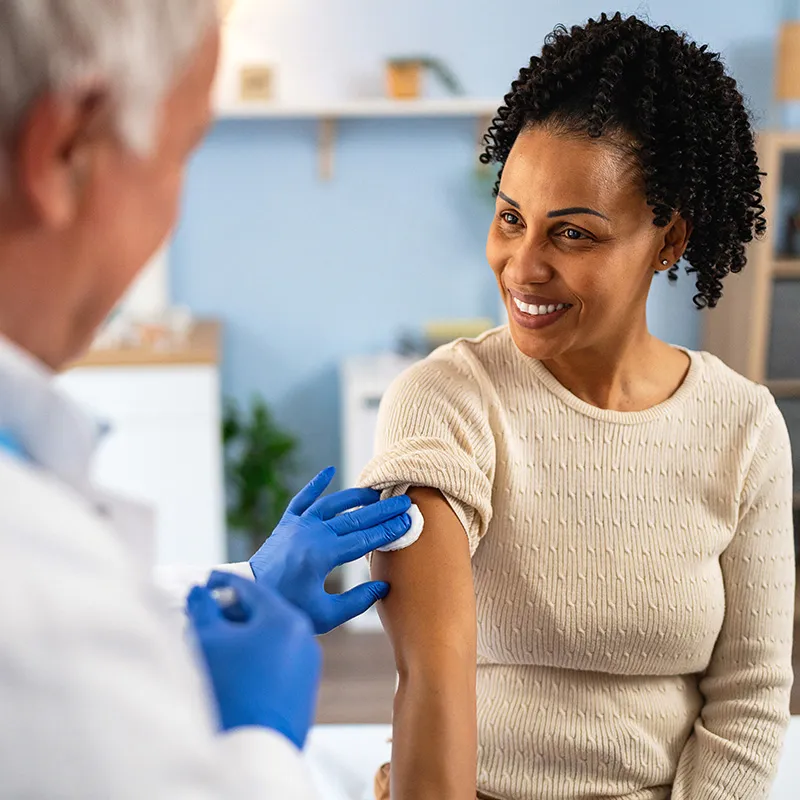Visit Vale Health Marketplace?
You are leaving balladhealth.org to visit Vale Health’s Wellness Marketplace.
Disclaimer: Ballad Health does not sponsor, endorse or recommend any product or resource listed in the marketplace.
It might be easy to skip an annual check-in because you’re not experiencing symptoms, but routine care and screenings can help catch risks before symptoms show.
It all starts with a conversation between you and your primary care provider about what tests are right for you and when to begin screening. Not sure how to start the conversation? We have a new screenings tool to help you figure out what screenings fit your situation.
Ages: Mammograms are recommended every other year for women starting at age 40 and continuing through age 74. However, this recommendation can change based on your personal risk factors.
Why it’s important: Regular mammograms help detect breast cancer early, often before symptoms appear – giving you less invasive treatment options and better outcomes.
Ages: It’s generally recommended that most women begin cervical cancer screenings at age 21 and end at the age of 65, depending on the type of screening.
Why it’s important: Regular screenings can detect changes in cervical cells early, making it easier to prevent cancer before it starts.
Ages: Start regular screening at 45, and continue until 75.
Why it’s important: Screening can find colorectal cancer in its earliest stages before symptoms develop – making it easier to treat and increasing your chances of a full recovery.
Ages: Low-dose CT lung cancer screenings are recommended for adults ages 50 to 80 who are at high risk. While clinical guidelines support screening through age 80, most insurance plans, including Medicare, currently cover screenings for people ages 50 to 77.
Why it’s important: A low-dose CT scan is one of the most effective tools to detect lung cancer early, when it’s most treatable. Getting screened can give you peace of mind and it could save your life.
Ages: It’s recommended that everyone have a conversation with their primary care provider about heart disease risks, regardless of age. This is especially important if you have family history, high blood pressure, high cholesterol or other risk factors.
Why it’s important: Heart disease is the leading cause of death in the United States, but many risk factors can be managed with lifestyle changes and help from your primary care team. Knowing your personal risk helps you and your provider take the right steps to protect your heart health.
Ages: Your doctor may recommend a calcium scoring if you have major risk factors for heart disease. In some cases, people younger than 40 may also qualify if they have multiple risk factors.
Why it’s important: Knowing your calcium score can help you and your doctor take steps to reduce your risk of heart disease, such as heart attacks or strokes.
Ages: Pediatric and adult annual wellness visits are recommended for all ages.
Why it’s important: Some medical conditions that require early detection, such as high blood pressure, diabetes and high cholesterol might have no symptoms at all. This makes an annual visit with your provider vital to maintaining good health.
Ages: Typically recommended for men ages 55 to 69 after discussing prostate testing with a provider. Your doctor can help you determine the right time to begin screening based on your personal risk factors.
Why it’s important: Not every case of prostate cancer needs immediate treatment. It's recommended that you and your provider weigh the benefits and risks based on your health, age and preferences.
Your mom and genetic testing saved your life. A couple of months later, and it would have been a different story.
Ballad Health offers a free, secure online screenings tool that helps you understand which health screenings are right for you. By answering a few quick questions about your age, sex, family history and lifestyle habits, you’ll receive a personalized list of suggested screenings in just minutes.
Your privacy is important to us. This tool is completely confidential and secure, and your information is never shared. It’s a simple, trusted way to take the first step toward better health and early detection.


Talk with your healthcare provider about which vaccines are recommended for you based on your age, health history and risk factors.
Common vaccines for adults may include:




You can use our find-a-doctor tool to find your current primary care provider to schedule your next appointment, or find a new general doctor near you who aligns with your personal health goals.
Need help finding a doctor in your area? Our call center team will guide you through your options and insurance coverage to help you quickly find a doctor near you accepting new patients. Agents are available Monday through Friday, 8 a.m. to 5 p.m.
Health screenings are medical tests, exams or procedures that help your doctor detect potential health issues – sometimes before symptoms appear, and sometimes to monitor or detect existing concerns. While many screenings are preventive and aim to catch problems early, others are used to assess the status of your health or follow up on known risk factors.
Early detection leads to better outcomes – we recommend speaking with your doctor or using our free online screening tool to learn what screenings may be right for you.
Preventative and preventive screenings are specific tests designed to catch health issues early before symptoms appear. These screenings might include cancer screenings, heart health checks and diabetes testing.
Even if you feel fine, screenings can uncover conditions like high blood pressure, diabetes or certain cancers early when they’re easier to treat. Many health conditions don’t show symptoms until they’ve already progressed, so regular screenings can provide a more accurate picture of your overall health status.
Risk factors are traits or habits that can increase your chances of developing a health condition. These can include things like family history, lifestyle choices, age or environmental exposures. Your primary care provider will help you understand your personal risk profile and recommend screenings tailored to you. Before your visit, you can use our online screening tool to give you a starting point for your conversation with your provider.
A medical screening may include things like:
• Blood pressure checks
• Blood tests, such as cholesterol or glucose
• Cancer screenings like mammograms or colonoscopies
• Physical and wellness exams
Your provider will guide you through what’s appropriate based on your age, health history and lifestyle.
Some common health screenings offered at Ballad Health include:
• Mammograms for breast cancer
• Pap and HPV tests for cervical cancer
• Colonoscopy and stool tests for colorectal cancer
• Blood pressure and cholesterol checks for heart disease
• Blood glucose tests for diabetes
• Low-dose CT scans for those at risk of lung cancer
• Prostate exams for prostate cancer
Screening schedules vary by age or risk level. We recommend using our free online screenings tool or speaking with your provider to help determine the right timeline for you.
What takes place during a screening appointment can vary depending on the type of test. Some screenings are like wellness visits, involving a review of your health history and a physical exam. Others may include specific tests – such as blood work, imaging scans or other procedures using specialized equipment.
You’ll also have the opportunity to ask your provider questions and talk about your health goals. Your provider will guide you through what to expect based on the type of screening you’re receiving.
Yes. As you age, your risk for certain conditions increases, and your screening needs may change. For example, you may need more frequent screenings for heart disease or cancer. Your doctor or provider will adjust your care plan to match your needs.
Many screenings are covered by insurance, especially those considered preventive. Your insurance provider can help you better understand your coverage.
You may not need a referral for basic screenings, but some specialized tests may require one. Your care team can help you navigate the process based on what screenings are recommended for you.
Ballad Health offers screenings at variety of locations throughout East Tennessee and Southwest Virginia, including primary care clinics, imaging centers, breast centers and hospitals. We also offer a mobile health clinic, which works to bring screenings to rural communities in our area.
You can use our find a provider tool to help locate a doctor near you.